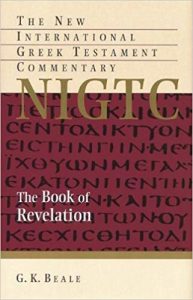 Rev. Dr. Gregory K. Beale (PhD, Cambridge) is the author of The Book of Revelation in The New International Greek Testament Commentary. He holds the J. Gresham Machen Chair of New Testament and is Research Professor of New Testament and Biblical Interpretation at Westminster Theological Seminary. Dr. Beale is an ordained minister in the Orthodox Presbyterian Church.
Rev. Dr. Gregory K. Beale (PhD, Cambridge) is the author of The Book of Revelation in The New International Greek Testament Commentary. He holds the J. Gresham Machen Chair of New Testament and is Research Professor of New Testament and Biblical Interpretation at Westminster Theological Seminary. Dr. Beale is an ordained minister in the Orthodox Presbyterian Church.
Dr. Beale has made a number of contributions to conservative Biblical hermeneutics, particularly in the area of the use of the Old Testament in the New Testament. He served as the president of the Evangelical Theological Society in 2004. In 2013, he was elected by Westminster Theological Seminary to be the first occupant of the J. Gresham Machen Chair of New Testament.
His books include Commentary on the New Testament Use of the Old Testament (editor with D.A. Carson), We Become What We Worship: A Biblical Theology of Idolatry, The Temple and the Church’s Mission: A Biblical Theology of the Dwelling Place of God, and IVP New Testament Commentary on 1-2 Thessalonians.
7 Questions on Revelation in the NIGTC Commentary Series
Dr. Beale graciously agreed to answer my questions about his Revelation commentary, for which I am very grateful. He also participated in an interview on his Colossians and Philemon commentary in the Baker Exegetical Commentary on the New Testament series, which I encourage people to read.
1. What previous research and/or personal interests led you to this project and helped prepare you to write this commentary on Revelation?
I wrote a Ph.D. dissertation on “The Use of Daniel in Jewish Apocalyptic Literature and in the Revelation of St. John” at Cambridge University in England. I also taught a repeated course on an exegesis of the Greek text of Revelation at Gordon-Conwell Theological Seminary.
2. Who is the intended audience for this commentary? Would it benefit pastors? professors? students? lay Christians in the local church?
Pastors, students, and scholars. I put English in parentheses after Greek words so non-Greek readers can follow the Commentary discussion.
3. What is unique about this commentary? What contribution does it make to studies of Revelation?
Use of the OT in Revelation; relevance of Jewish backgrounds to Revelation.
4. What section or passage of this commentary was particularly memorable to research and write? Why?
Revelation 4-5 were especially memorable, since the glory of God and the Lamb on the throne are the main point.
5. What personally edified you in writing this commentary, increasing your affections for Christ?
Seeing the unity of all Scripture coming to a peak in Revelation was very edifying. Also, understanding that the visionary parables in Revelation are an escalated heavenly continuation of Christ’s earthly parabolic ministry was encouraging.
6. Besides your commentary, what are your top recommended books (commentaries or otherwise) on Revelation?
Smalley’s commentary (IVP); Bauckham’s Climax of Prophecy and his shorter monograph on Revelation with Cambridge University Press.
7. What is next for you? What project are you currently working on? How can people follow your work and ministry?
I just submitted a commentary manuscript on Colossians and Philemon for the Baker Exegetical Commentary series. I am also beginning to work on a commentary on the Pastoral Epistles for the Zondervan Exegetical Commentary series (co-authored with Christopher Beetham).
I am about to submit a long article to a journal on Isaiah 65:20, as this relates to millennial debates.
Own G.K. Beale’s Revelation commentary
The link provided will direct you to this volume via it’s exact ISBN number:
- Get Dr. Beale’s commentary on Revelation at Amazon
- Get Dr. Beale’s commentary on Revelation on Christian Book Distributors
Recent Posts
David Jeremiah, a renowned pastor, author, and speaker, has captivated the hearts of many with his compelling sermons. His messages resonate deeply with diverse audiences, leaving an enduring...
Tim Keller, a distinguished pastor, theologian, and author, has garnered a devoted following through the profound impact of his sermons. In this article, we will explore seven compelling reasons...
